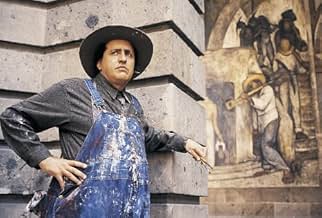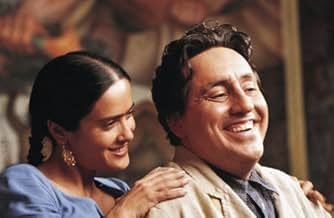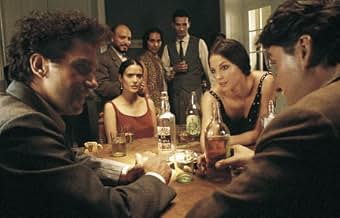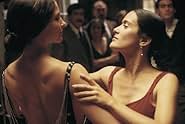Una biografía de la artista Frida Kahlo, quien canalizó el dolor de una lesión paralizante y su matrimonio tempestuoso en su trabajo.Una biografía de la artista Frida Kahlo, quien canalizó el dolor de una lesión paralizante y su matrimonio tempestuoso en su trabajo.Una biografía de la artista Frida Kahlo, quien canalizó el dolor de una lesión paralizante y su matrimonio tempestuoso en su trabajo.
- Direção
- Roteiristas
- Artistas
- Ganhou 2 Oscars
- 17 vitórias e 47 indicações no total
Patricia Reyes Spíndola
- Matilde Kahlo
- (as Patricia Reyes Spindola)
Loló Navarro
- Nanny
- (as Lolo Navarro)
Fermín Martínez
- Painter on Bus
- (as Fermin Martinez)
Avaliações em destaque
"Frida" is a beautifully done biopic about Mexican artist and icon Frida Kahlo. Salma Hayek plays this role very well. She exhibits all the passion that goes into being an artist, especially when playing off Alfred Molina, who plays Diego Rivera, husband of Frida Kahlo, and a famous Mexican artist in his own right. What really impressed me was the artistic references in the movie. I loved seeing the paintings coming to life! I also liked the surreal animated sequences, particularly the hospital nightmare, populated with Day of the Dead-style skeletons. Few movies have ever made me regard them as a work of art. "Frida" is definitely one of them!
I watched this film for the first time, last night,and, it is one of the most beautiful films I have ever seen. There are shades of "Surviving Picasso" about it. Yet, this movie transcends the Picasso film on a number of levels. Where "Surviving Picasso" is all about Anthony Hopkins masterful performance, "Frida" has a chemistry between its leading actors that you just don't see enough of in modern cinema. Yes, Salma Hayek inhabits the character of Frida and makes it entirely her own. But Alfred Molina's portrayal of her overweight, philandering husband really brings this movie to life. History is important to this movie also. Although removed from the turbulent events dominating European politics in the 1930s, Mexico embraces the ideology that will soon tear Europe apart and reflects that ideology in its art. Diego Rivera, as portrayed by Molina, is certainly a greater lover of women and painting than he is of political ideology, but the fact that he plays host to the exiled Trotsky shows that he is willing to put himself in harms way for the sake of his political principles. Trotsky is played charmingly by Geoffery Rush and his introduction to the story sends Diego and Frida's marriage to another level. This movie never fails to surprise you and if you have not seen it yet, you should.
Usually, when you see a biopic about a famous artist and genius you either get to see a tragic, suffering creature or an idealized God. And often it's always the same: He/she was born, had a difficult childhood, created some masterpieces, had some affairs (usually with actors/actresses or/and musicians) and dies a sad and lonely death. But what a refreshing difference "Frida" was! Frida Kahlo's life was more suffering than joy, yet the movie does not pity her all the time but shows Frida's lust for life, love, art and her husband Diegor Riviera.
It tells the story of a really unusual life: When Frida is a student, young, beautiful, full of live and in love with a gorgeous boy (Diego Luna from "Y tu mama tambien" and "Dirty Dancing Havanna Nights) she experiences a horrible accident when her bus crashes with a tram. Frida then becomes a cripple for the rest of her life, but through this she experiences herself in a new way and starts to paint, mostly self-portraits where she deals with her pain, her family, political situations and people she loves. Soon after the accident a miracle happens: Frida learns to walk again and the first thing she does is to visit the famous artist and painter Diego Rivera to ask his opinion about her paintings the beginning of an unusual and often complicated love story that should last a lifetime.
We get to learn a woman who experiences so many tragic things in life that it should be enough to commit suicide, yet she never gives up, grows stronger and one thing that certainly helps her through hard times is her wit, her dignity and her love for life and art. She takes what she wants and needs (which also includes love affairs with men and women) but has also a lot to give. Plus her works, so honest, brutal but also beautiful in their truth, reveal one of the greatest talents of our time.
A whole lot of this movie works of course through its female protagonist, whose role is not that easy and a real challenge sometimes. The wonderful and graceful Salma Hayek, who is immensely gifted, does really great work here and awakes Frida and her world to life again. Hayek perfectly holds the balance between triumphs and losses, joy and sorrow, madness and daily routine, life and death. She is just a pleasure to watch, she doesn't play Frida, she IS Frida. Another important character is of course Diego Rivera, the greatest love of Frida's life. Alfred Molina, a great British actor, is perfectly casted for this role and besides, has a remarkable resemblance to the real Diego. Outstanding performances also by the supporting cast: Valeria Golino, Ashley Judd (with a great imitation of the Mexican accent), Geoffrey Rush and Edward Norton.
Frida a feast for the senses full of life and exploding emotions and a tribute to a truly unique and remarkable woman, who was the greatest female artist of the last century!
It tells the story of a really unusual life: When Frida is a student, young, beautiful, full of live and in love with a gorgeous boy (Diego Luna from "Y tu mama tambien" and "Dirty Dancing Havanna Nights) she experiences a horrible accident when her bus crashes with a tram. Frida then becomes a cripple for the rest of her life, but through this she experiences herself in a new way and starts to paint, mostly self-portraits where she deals with her pain, her family, political situations and people she loves. Soon after the accident a miracle happens: Frida learns to walk again and the first thing she does is to visit the famous artist and painter Diego Rivera to ask his opinion about her paintings the beginning of an unusual and often complicated love story that should last a lifetime.
We get to learn a woman who experiences so many tragic things in life that it should be enough to commit suicide, yet she never gives up, grows stronger and one thing that certainly helps her through hard times is her wit, her dignity and her love for life and art. She takes what she wants and needs (which also includes love affairs with men and women) but has also a lot to give. Plus her works, so honest, brutal but also beautiful in their truth, reveal one of the greatest talents of our time.
A whole lot of this movie works of course through its female protagonist, whose role is not that easy and a real challenge sometimes. The wonderful and graceful Salma Hayek, who is immensely gifted, does really great work here and awakes Frida and her world to life again. Hayek perfectly holds the balance between triumphs and losses, joy and sorrow, madness and daily routine, life and death. She is just a pleasure to watch, she doesn't play Frida, she IS Frida. Another important character is of course Diego Rivera, the greatest love of Frida's life. Alfred Molina, a great British actor, is perfectly casted for this role and besides, has a remarkable resemblance to the real Diego. Outstanding performances also by the supporting cast: Valeria Golino, Ashley Judd (with a great imitation of the Mexican accent), Geoffrey Rush and Edward Norton.
Frida a feast for the senses full of life and exploding emotions and a tribute to a truly unique and remarkable woman, who was the greatest female artist of the last century!
Frida is a biopic, as decadent and beautiful as the art of Frida Kahlo. I can't imagine how you could make it any other way. Yes, we follow Frida through her dysfunctional and broken relationship with both Diego Rivera and the international socialist movement. But the way this story is told is key. The editing and cinematography pays enormous tribute to Frida's paintings and the genre of art that she represents. Salma Hayek is tremendous as Frida. Alfred Molina is tremendous as Diego. It's thoroughly exquisite.
It wouldn't matter what you might show or say - people who have taken a liking to an 'artist' or their particular 'style' will defend them regardless. So it probably is with Frida Kahlo and Diago Rivera. Every country must have its acclaimed legends good or bad - the USA with Pollock and Warhol, Spain with Picasso and so it goes - it's the law of economics and superiority, etc...Oh, not to mention art....
This glossy film version of Kahlo's life and work sets out to make a hero of her and nothing will stand in its way. In the attempt to do so it pulls out all stops ~ striking visual imagery from Mexican born director of photography Rodrigo Prieto (Water For Elephants '11) ~ marvelous visual effects from Dawson and Schrecker ~ good performances from most of the cast ~ OK (if overly voyeuristic) direction from Julie Taymor ~ evocative music score by Eliot Goldenthal ~ lots of color and angst.
Maybe there wasn't a great deal to work with in Kahlo's life, as the movie spends more time indulging in over detailed examinations of her somewhat sordid private life. This may not seem so sordid if you happen to be into numerous extramarital affairs --with either sex that just happens to suit the situation-- According to the screenplay Frida divorced Rivera on grounds of his extramarital affairs - even though she knew of these right from their first meeting and he had told her many times he was incapable of any control over them. Problem was, Frida's own marital agreement was often broken in the same way but unlike Frida, Rivera (it seems) was not willing to dabble with both sexes. It's also obvious Frida had been known for her unabashed carnal indulgences as a schoolgirl - let alone an adult - in or out of marriage.
Of course fans will excuse these dalliances on the grounds of her 'artistic' temperament and physical sufferings - well, so be it. Many will regard this movie highly (especially the fans) others may feel a little left out. Good looking but maybe not a great deal more...
This glossy film version of Kahlo's life and work sets out to make a hero of her and nothing will stand in its way. In the attempt to do so it pulls out all stops ~ striking visual imagery from Mexican born director of photography Rodrigo Prieto (Water For Elephants '11) ~ marvelous visual effects from Dawson and Schrecker ~ good performances from most of the cast ~ OK (if overly voyeuristic) direction from Julie Taymor ~ evocative music score by Eliot Goldenthal ~ lots of color and angst.
Maybe there wasn't a great deal to work with in Kahlo's life, as the movie spends more time indulging in over detailed examinations of her somewhat sordid private life. This may not seem so sordid if you happen to be into numerous extramarital affairs --with either sex that just happens to suit the situation-- According to the screenplay Frida divorced Rivera on grounds of his extramarital affairs - even though she knew of these right from their first meeting and he had told her many times he was incapable of any control over them. Problem was, Frida's own marital agreement was often broken in the same way but unlike Frida, Rivera (it seems) was not willing to dabble with both sexes. It's also obvious Frida had been known for her unabashed carnal indulgences as a schoolgirl - let alone an adult - in or out of marriage.
Of course fans will excuse these dalliances on the grounds of her 'artistic' temperament and physical sufferings - well, so be it. Many will regard this movie highly (especially the fans) others may feel a little left out. Good looking but maybe not a great deal more...
Você sabia?
- CuriosidadesFrida Kahlo's niece was so impressed with the film that she gave Salma Hayek one of Kahlo's necklaces.
- Erros de gravaçãoEarly in her New York trip Frida is watching 1933's King Kong (1933). Later she is called home to tend to her dying mother. Several scenes later we see her at her mother's grave and it shows that she died in 1932, a year before King Kong was released.
- Citações
Frida Kahlo: I had two big accidents in my life Diego, the trolley and you. You are by far the worse.
- ConexõesFeatured in The 60th Annual Golden Globe Awards (2003)
Principais escolhas
Faça login para avaliar e ver a lista de recomendações personalizadas
- How long is Frida?Fornecido pela Alexa
Detalhes
- Data de lançamento
- País de origem
- Centrais de atendimento oficiais
- Idiomas
- Também conhecido como
- Frida Kahlo
- Locações de filme
- San Luis Potosi, San Luis Potosí, México(exterior, second bus scene)
- Empresas de produção
- Consulte mais créditos da empresa na IMDbPro
Bilheteria
- Orçamento
- US$ 12.000.000 (estimativa)
- Faturamento bruto nos EUA e Canadá
- US$ 25.885.000
- Fim de semana de estreia nos EUA e Canadá
- US$ 205.996
- 27 de out. de 2002
- Faturamento bruto mundial
- US$ 56.298.862
- Tempo de duração
- 2 h 3 min(123 min)
- Cor
- Mixagem de som
- Proporção
- 1.85 : 1
Contribua para esta página
Sugerir uma alteração ou adicionar conteúdo ausente


































